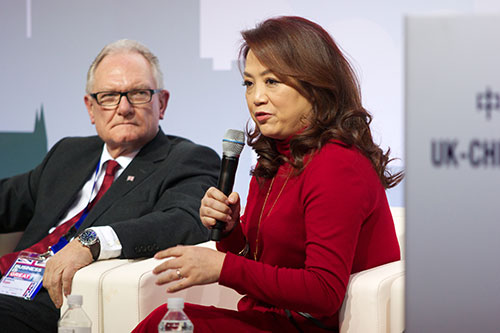Beijing, December 12, 2013—“I genuinely believe that we can be partners for growth. Partners because we are at different stages of development, yet complimentary to each other, partners because we believe in open economics, and partners because we want to free up our trading system.” On December 2nd, the UK Prime Minister David Cameron gave a clear message at the China-UK Business Summit as one of the highlights of his three-day visit in China. The Summit, where CKGSB served as the Strategic Partner, is the highest-level exchange between the two countries, attended by the largest UK business delegation in history, as well as over 300 domestic and international business leaders in China.
Wang Yang, China’s Vice Premier, attended the Summit and encouraged the audience from both sides to “take advantage of China’s reform and opening up, and bring our trade relations to a new stage.” As such, the two sides have set up a target of 100 billion US dollars of trade by 2015.
While everyone is excited and ‘overwhelming positive’, as one of the delegates expressed, taking the next step to conduct more expansive business with and in China requires a deeper look into this issue. As underlined by Lord Sassoon, Chairman of China-Britain Business Council, this Summit has made British small and medium enterprises (SMEs) realize that on the one hand, “it is not that difficult to do business in China”, but on the other hand, it is also quite true that “it is challenging and you need all the support.”
.jpg) In entering a new market, most companies will encounter a number of challenges, from new policies to changing consumers. To gain a better understanding of local consumers is essential to effectively position your company and products. During the Summit’s discussion, it was clear that Chinese consumers and the strategy for the Chinese market were of the most important issues for the audience. Dr. Teng Bingsheng, CKGSB’s Associate Dean of the European Campus and Associate Professor of Strategic Management, was invited to share his insights on these two concerns.
In entering a new market, most companies will encounter a number of challenges, from new policies to changing consumers. To gain a better understanding of local consumers is essential to effectively position your company and products. During the Summit’s discussion, it was clear that Chinese consumers and the strategy for the Chinese market were of the most important issues for the audience. Dr. Teng Bingsheng, CKGSB’s Associate Dean of the European Campus and Associate Professor of Strategic Management, was invited to share his insights on these two concerns.
Drawing on his research expertise and experience in engaging with our students and alumni—who include over 2,500 Chairman and CEOs running companies that comprise of 20% of China’s most valuable brands—Prof. Teng highlighted that Chinese consumers are changing and looking for “diversity”, instead of simply for “something expensive”. He believed this is exactly when the British companies could and should ‘recognize the trend and seize the opportunity’ by knowing the Chinese market better and partnering with Chinese companies more extensively.
Chinese companies have begun to realize that Chinese consumers are becoming more sophisticated and diversified, which is why companies are now going global to meet their consumers’ requirements. Sun Yiping, President of China Mengniu Dairy Company Ltd. and also a student at CKGSB, shed light on this conundrum at the Summit. As the largest diary company in China, Mengniu is already on its way to broaden its shareholders by including two of the biggest dairy companies in the world, Arla Food and Danone; to expand its products by working with Danone on R&D; and to diversify its management team by attracting talents from western countries. Another such example, as Prof. Teng raised in his comments, is Fosun, one of the most largest private company in China and yet another company led by CKGSB alumni, purchased a couple of European brands, such as Folli Follie. While German, French and even Greek companies are actively engaged with their Chinese counterparts to provide different products to Chinese consumers, British companies seem less active and behind in the market. As Sun Yiping indicated, while a number of Western companies sought to partner with Mengniu in jointly conduct business in China, during her recent trip to London, she realized that “half of the British companies she encountered don’t know Mengniu yet.”

In only 13 years, Mengniu Diary has become the largest dairy company in China. As a matter of fact, a majority of China’s most valuable brands have been created over the past two decades. The Chinese market is dynamic and constantly transforming, leading it to be one of the most promising yet challenging markets in the world. “This leads to opportunities for British companies.” suggested Prof. Teng, “By working together (with Chinese companies) we can create new brands with new value (for different levels and segments of Chinese consumers).” By identifying Chinese consumers better, positioning the right products for the Chinese market, operating jointly with Chinese partners, British companies could deliver better performance in China.